"I do it because I can."
Scott MacLennan Wins Hillary Medal
"This is one of three pieces about the work of The Mountain Fund and their director Scott MacLennan. MacLennan was recently designated winner of the Sir Edmund Hillary Mountain Legacy Medal. Please see:
Volunteering for The Mountain Fund in Kathmandu, by Olivia Bryanne Zank
The Mountain Fund's 2010 Nepal Medical Trek, by Chuck Lovely
See also http://www.wanderingeducators.com/best/stories/participatory-tourism-climber-adopts-village.html for an article about Tony Freake, previous winner of the Hillary Medal."
Scott MacLennan, founder and Executive Director of The Mountain Fund (MountainFund.org), has been selected to receive the 2010 Sir Edmund Hillary Mountain Legacy Medal.
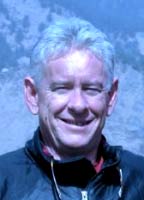
I've written about the previous Hillary Medal winner, Tony Freake, but just to recapitulate before I report on Scott MacLennan's work: the Sir Edmund Hillary Mountain Legacy Medal is a project of Mountain Legacy, a Nepalese NGO (MountainLegacy.org). The Hillary Medal was officially authorized by Sir Edmund Hillary (first summitter of Mount Everest) in 2003, and is awarded "for remarkable service in conservation of culture and nature in mountainous regions." The Medal itself recognizes Sir Edmund Hillary's contributions and lifelong commitment to mountain people and their environments. Through his personal efforts, and through the foundations that he helped establish in New Zealand, Canada, the United States, and Germany, Hillary built some 30 schools, 2 airstrips, 2 hospitals and 11 village clinics. He also assisted in the restoration of monasteries, instituted scholarship and teacher training programs and established reforestation projects in Khumbu (the Nepalese district encompassing Mt. Everest), Mustang and the Annapurna region. Alumni of Hillary schools have gone on to illustrious careers in mountain development and conservation. In every case, Sir Edmund undertook projects at the specific request of the local residents. The Hillary Medal was established in the hope of encouraging others to follow Sir Edmund’s example.


Sir Edmund Hillary.
Photo courtesy of Hillary Foundation. Hillary Medal. Photo courtesy of Seth Sicroff
Both Mountain Legacy and the Hillary Medal were initiated by my wife Empar and me in conjunction with the 2003 Namche Conference ("People, Park, and Mountain Tourism").
Okay, back to the new Hillary Medal winner. Scott MacLennan is co-owner of an Albuquerque NM enterprise that manages low income housing. For the past decade, he has also been engaged in an expanding network of development and conservation projects under the umbrella of his non-profit corporation, The Mountain Fund (www.mountainfund.org). Scott's wife and collaborator Sunita is Nepali, and they work half the year in Nepal and half in Albuquerque.
I asked Scott to explain how he ended up in Nepal, and more specifically, how he got sucked into saving the world. Here's his story:
Thank you for inviting me to tell you my story.
After the death of Anatoli Boukreev [a Russian mountain climber best known as the villain and hero of Jon Krakauer's Into Thin Air], a group of his friends in the US decided to start a memorial fund to honor him and to promote climbing and cultural exchanges between American and Central Asian climbers. A childhood friend of mine who had been a regular climbing partner of Boukreev's invited me to an inaugural kick-off of the fund at Neptune Mountaineering in Boulder. I met Linda Wylie, Boukreev's girlfriend, and through her learned about a small clinic she and Anatoli had given supported. The clinic was located in Goljung in the Rasuwa District of Nepal.

Rasuwa, Nepal. Courtesy of Wikipedia
Linda was about to leave for a Peace Corps gig in the Ukraine and asked if I'd be willing to fill in as contact person for this clinic -- "just sort of keep an eye on things" -- while she was out of the country. Naively, I agreed. Soon afterward a Nepali fellow appeared in New Mexico looking for "Miss Linda." He was from the clinic and bore news that the little operation was running out of money and facing closure. The guy lived with me for six months and talked every day about the financial need of this clinic. Finally, one day, over a breakfast burrito at the Frontier Restaurant I asked how much money was needed. When I heard that the cost of the clinic was about $7,000 per year and that it served over 8,000 people I made the fatal error of exclaiming that such an amount was "chump change" and could be raised easily in the States. As it turned out, this blurt was taken as a commitment on my part to actually go out and get the chumps in question to contribute that change.
I did indeed go out and raise the money ... by pestering friends about the clinic for weeks on end. After that, I felt obliged to travel to Nepal and see what the heck I had just gotten all my friends into. That was ten years ago.
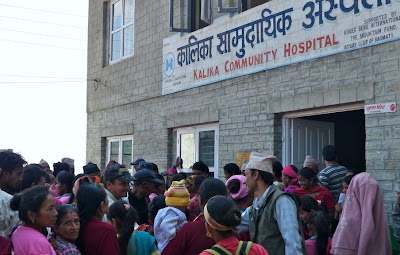
Kalika Community Hospital
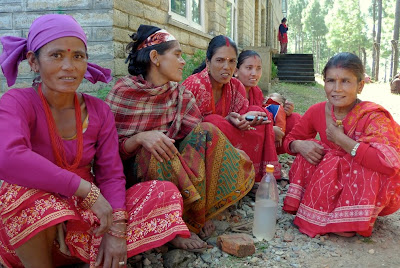
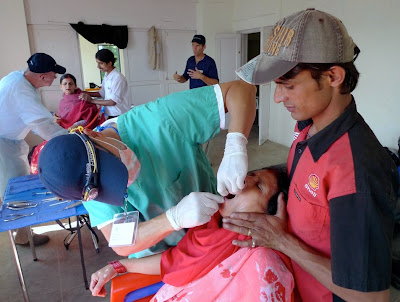
The Rasuwa District of Nepal lies on the northern border of the Madhya Manchal (Central District). It borders on Tibet, and most of the populace is Tamang, an ethnic group whose name means "horse warrior." The most famous holy lake of Nepal, Gosainkunda (4380m.a.s.l.), lies in this district, as do the popular Langtang and Helambu trekking routes; in terms of household wealth, Rasuwa ranks 65th out of Nepal's 75 districts.
It is said that the great god Shiva gouged out Lake Gosainkunda with his trishul (trident) as he was flailing about searching for cold water after selflessly swallowing the Halahala poison that threatened to destroy all of creation. The district's need for medical assistance was still urgent when I first visited.

Gosainkunda Lake, courtesy of Wikipedia
The Goljung clinc was just as had been described to me: one small facility serving the serving the very poorest of the poor in the villages of Gatlang, Goljung, Chilme, Thambuchet and Tatopani. When I understood fully the need for health care in this area and that it could actually be provided for $1.00 per person per year, and that if I didn't do something it would all disappear, it seemed like a no-brainer. I was hooked.
Finding backers was not so easy. I ended up going back to my friends to beg for money again. One, a very wealthy person, gave me a check for $500 with the admonishment, "Don't come back and ask me again." So I got serious. I set up The Mountain Fund. I attended outdoor events such as Outdoor Retailer Show and Ouray Ice Festival, setting up my little makeshift booth. Gradually, money came in, and I returned to Nepal again and again, each time undertaking new no-brainers.
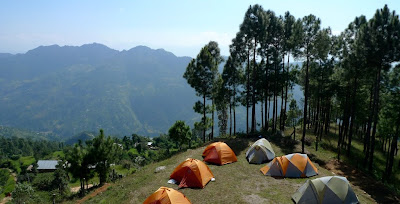
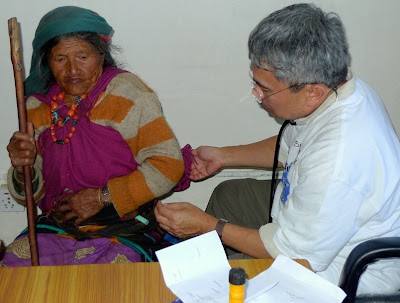
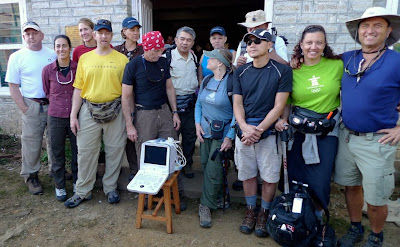
For five years, I supported the Goljung clinic and further developed it by adding a modern medical laboratory.The village of Thulo Syabru, a couple of valleys away, persuaded me to open another clinic, which has now been in operation about four years. The village recently built a new school building and were able to add grades 7 and 8. The government couldn't provide a teacher for that class, so The Mountain Fund is covering the salary.
We have also helped rehabilitate Manche Gompa, a nearby monastery built 350 years ago by a single monk over the course of twelve years, which had fallen into heartbreaking disrepair. Substantially restored, the gompa is back in service for the community's traditional ceremonies and spiritual protection. We hope to undertake restoration of an even older facility near Nagthali next year... if funds become available.
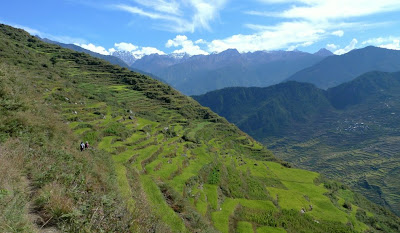
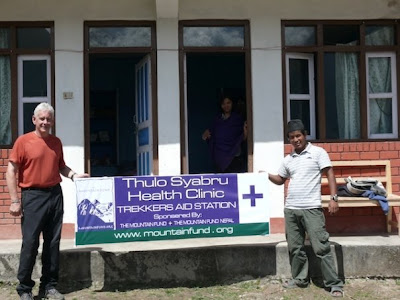
Scott MacLennan
A couple of years ago, the parliamentary representative of Rasuwa district invited me to partner with him in the establishment of a hospital. In the community of Kalikastan, there was a property that had been used as a hospital before the ten-year civil war in Nepal. We obtained the property from the government. Today the hospital has 15 beds for in-patient use, an ambulance, 24/7 out-patient service, pharmacy, x-ray, ecg and ultrasound, dental and eye care.
This year we partnered with the District Health Office to open a 24/7 birthing center in the village of Thambuchet. The DHO had constructed a new building, but could not fund the staff or equipment. The Mountain Fund took care of those needs. The center now serves approximately approximately 8,000 people living in several of the poorest villages with the highest birth rates in the country.
We've just received permission from Nepal's Council for Technical Education & Vocational Training (CTVET) to expand the Kalika Community Hospital into a training center. The district needs approximately 75 more Community Health Assistants (CMA's) in order to provide everyone effective access to basic health services. Although the CTVET requires that training centers be based at hospitals with at least 50 beds, we have been granted an exception. At present, despite the CMA shortage, Tamangs are unable to acquire the training locally; they have to go to Kathmandu, where they face the hurdles of high costs and lack of accommodations. Few Tamang families are willing to let their daughters undertake this kind of displacement. Currently, with several staff vacancies in Rasuwa health posts, the government has been forced to recruit CMAs from distant regions of Nepal. Due to cultural and linguistic differences (Tamang is the primary language, not Nepali) many of these "outsiders" are uncomfortable. So, we have begun remodeling at Kalika Hospital to incorporate facilities for training and lodging. By the end of 2010, we hope to be ready to start educating young Tamangs to serve their own communities' needs.
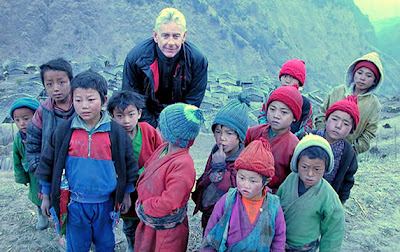
The hospital and the two clinics we manage are accessible to the entire population of the district (45,000) and also serve the residents of parts of adjacent Nuwakot district, which means we serve around 60,000 people. Our facilities are sited in central areas along major trails, so that residents of served villages are within a day's trek of a clinic or hospital, each of which actually treat about forty patients per week.
The Mountain Fund opened a volunteer program in Kathmandu three years ago (MountainVolunteer.org). Last year we hosted over 100 volunteers from all over the world. This year we are on track to host even more. We have three houses where we lodge and feed both the volunteers and also the full-time staff who supervise them. These volunteers have donated thousands of hours of service in local schools, orphanages, and Nepali NGOs. Read about one Volunteer's experience here.
Every year we host our Moving Medical Camps in the Rasuwa District. Last year, we did three camps and brought over 40 western medical professionals to the district in order to provide free health care and one-on-one training to our Nepali staff at the hospital and clinics. So far this year, we have thirty participants signed up for two camps, and a third camp is scheduled for the fall. Participants enjoy trekking through the district, and we stop at the hospital and clinics for medical camp and training days. These programs bring special services and competences to the communities, as well as an economic boost. Read about one of these expeditions in our earlier article
http://www.wanderingeducators.com/best/traveling/participatory-tourism-3-student-returns-clinic.html.
For the past five years, The Mountain Fund has acted as a nonprofit incubator and "fiscal agent" for start-up NGOs and Nepali registered charities. We have provided a portal to several worthy NGO's who cannot otherwise raise money from the USA. At present, we are helping the Women's Foundation, Orchid Garden, Mount Everest Foundation, Social Development Center and several other Nepali NGO's in this way. Our volunteers help them write grant proposals and fundraise as well. During this time we have helped to launch nonprofits in other countries around the world. Girl's Education International, the North East India Project, the Gerrard McDonnell Memorial Fund, the Anatoli Boukreev Memorial Fund, and Paradox Sports -- to name a few -- all began by operating under our 501-c3 charity status.
Our latest project is Punarbal Plus, the first school for HIV-affected children. Located in Kathmandu, the school has approximately 60 students, including 16 in a boarding program. These children are not accepted by government schools. The Mountain Fund is the primary source of funding, and we make it possible for the children to receive both primary education as well as medical management. Collaterally, the school helps educate people about HIV.
We've also established a micro-finance program in Cusco, Peru, and we have been working for the past three years with the village of Upis at the base of Mount Ausangate to establish a community health clinic. The village has agreed to donate the land and adobe bricks needed to make a clinic building. We are still looking for funds to equip and staff the clinic.
Thanks for taking the time to find out about our work. For more information, please visit our Web site. I'd like to add that the Rasuwa Healthcare network (hospital and two clinics) still costs under $1.00 per person per year for each of the 45,000 district inhabitants that are served. The Mountain Fund is a strictly volunteer organization with no paid staff in our Albuquerque office. Nepali staff are of course paid at local standards. For me, it's a labor of love. I do it because it can be done -- and because it can be done for so little money.
=================
Dr. Beau Beza, chair of the Hillary Medal Selection Committee, observes that "Natural preservation in inhabited mountainous regions depends on developing sustainable and prosperous communities. This connection between human welfare and natural welfare is something Sir Edmund understood quite clearly. Long before he founded the reforestation program, he was building schools, and before the 1963 Himalayan Schoolhouse Expedition could get down to work, Hillary had to confront and overcome an emerging smallpox epidemic. Education, gender equity, cultural continuity, economic opportunity, and human health are vital preconditions to a commitment to environmental stewardship. Strategically and philosophically, MacLennan is truly a philanthropist in the mould of Sir Edmund Hillary."
Scott MacLennan will receive his award later this year at a ceremony in Melbourne, Australia. Scott MacLennan is currently in Nepal and may be contacted for interviews: scott[at]mountainfund.org. For further information, visit HillaryMedal.org or email Dr. Beau Beza, Chair of the Hillary Medal Selection Committee: beza[at]hillarymedal.org.
Seth Sicroff, Nepal Editor for Wandering Educators
Manager, Sunrise Pashmina
All photos courtesy and copyright Scott MacLennan, except where noted.
-

- Log in to post comments



















